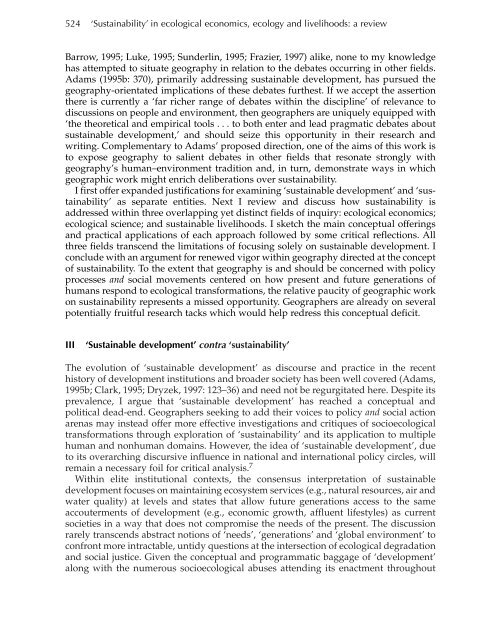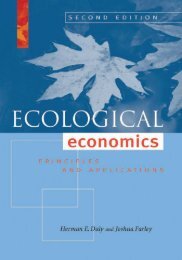2FGJN3
2FGJN3
2FGJN3
- No tags were found...
You also want an ePaper? Increase the reach of your titles
YUMPU automatically turns print PDFs into web optimized ePapers that Google loves.
524 ‘Sustainability’ in ecological economics, ecology and livelihoods: a reviewBarrow, 1995; Luke, 1995; Sunderlin, 1995; Frazier, 1997) alike, none to my knowledgehas attempted to situate geography in relation to the debates occurring in other fields.Adams (1995b: 370), primarily addressing sustainable development, has pursued thegeography-orientated implications of these debates furthest. If we accept the assertionthere is currently a ‘far richer range of debates within the discipline’ of relevance todiscussions on people and environment, then geographers are uniquely equipped with‘the theoretical and empirical tools . . . to both enter and lead pragmatic debates aboutsustainable development,’ and should seize this opportunity in their research andwriting. Complementary to Adams’ proposed direction, one of the aims of this work isto expose geography to salient debates in other fields that resonate strongly withgeography’s human–environment tradition and, in turn, demonstrate ways in whichgeographic work might enrich deliberations over sustainability.I first offer expanded justifications for examining ‘sustainable development’ and ‘sustainability’as separate entities. Next I review and discuss how sustainability isaddressed within three overlapping yet distinct fields of inquiry: ecological economics;ecological science; and sustainable livelihoods. I sketch the main conceptual offeringsand practical applications of each approach followed by some critical reflections. Allthree fields transcend the limitations of focusing solely on sustainable development. Iconclude with an argument for renewed vigor within geography directed at the conceptof sustainability. To the extent that geography is and should be concerned with policyprocesses and social movements centered on how present and future generations ofhumans respond to ecological transformations, the relative paucity of geographic workon sustainability represents a missed opportunity. Geographers are already on severalpotentially fruitful research tacks which would help redress this conceptual deficit.III‘Sustainable development’ contra ‘sustainability’The evolution of ‘sustainable development’ as discourse and practice in the recenthistory of development institutions and broader society has been well covered (Adams,1995b; Clark, 1995; Dryzek, 1997: 123–36) and need not be regurgitated here. Despite itsprevalence, I argue that ‘sustainable development’ has reached a conceptual andpolitical dead-end. Geographers seeking to add their voices to policy and social actionarenas may instead offer more effective investigations and critiques of socioecologicaltransformations through exploration of ‘sustainability’ and its application to multiplehuman and nonhuman domains. However, the idea of ‘sustainable development’, dueto its overarching discursive influence in national and international policy circles, willremain a necessary foil for critical analysis. 7Within elite institutional contexts, the consensus interpretation of sustainabledevelopment focuses on maintaining ecosystem services (e.g., natural resources, air andwater quality) at levels and states that allow future generations access to the sameaccouterments of development (e.g., economic growth, affluent lifestyles) as currentsocieties in a way that does not compromise the needs of the present. The discussionrarely transcends abstract notions of ‘needs’, ‘generations’ and ‘global environment’ toconfront more intractable, untidy questions at the intersection of ecological degradationand social justice. Given the conceptual and programmatic baggage of ‘development’along with the numerous socioecological abuses attending its enactment throughout



